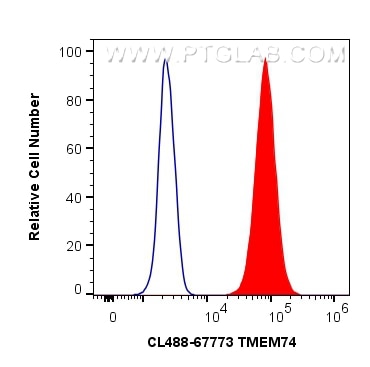Tested Applications
| Positive FC (Intra) detected in | HEK-293 cells |
Recommended dilution
| Application | Dilution |
|---|---|
| Flow Cytometry (FC) (INTRA) | FC (INTRA) : 0.40 ug per 10^6 cells in a 100 µl suspension |
| It is recommended that this reagent should be titrated in each testing system to obtain optimal results. | |
| Sample-dependent, Check data in validation data gallery. | |
Product Information
CL488-67773 targets TMEM74 in FC (Intra) applications and shows reactivity with Human samples.
| Tested Reactivity | Human |
| Host / Isotype | Mouse / IgG1 |
| Class | Monoclonal |
| Type | Antibody |
| Immunogen | TMEM74 fusion protein Ag22359 Predict reactive species |
| Full Name | transmembrane protein 74 |
| Calculated Molecular Weight | 305 aa, 33 kDa |
| Observed Molecular Weight | 33 kDa |
| GenBank Accession Number | BC030710 |
| Gene Symbol | TMEM74 |
| Gene ID (NCBI) | 157753 |
| RRID | AB_2934568 |
| Conjugate | CoraLite® Plus 488 Fluorescent Dye |
| Excitation/Emission Maxima Wavelengths | 493 nm / 522 nm |
| Form | Liquid |
| Purification Method | Protein G purification |
| UNIPROT ID | Q96NL1 |
| Storage Buffer | PBS with 50% glycerol, 0.05% Proclin300, 0.5% BSA , pH 7.3 |
| Storage Conditions | Store at -20°C. Avoid exposure to light. Stable for one year after shipment. Aliquoting is unnecessary for -20oC storage. |
Background Information
Transmembrane protein 74 (TMEM74), plays an essential role in autophagy during cell starvation and other stress conditions. TMEM74 is localized to the lysosome and autophagosome. It has been rreported that TMEM74-induced autophagy may be associated with PI3K signal transduction. (PMID: 19029833, 18294959)
Protocols
| Product Specific Protocols | |
|---|---|
| FC protocol for CL Plus 488 TMEM74 antibody CL488-67773 | Download protocol |
| Standard Protocols | |
|---|---|
| Click here to view our Standard Protocols |



